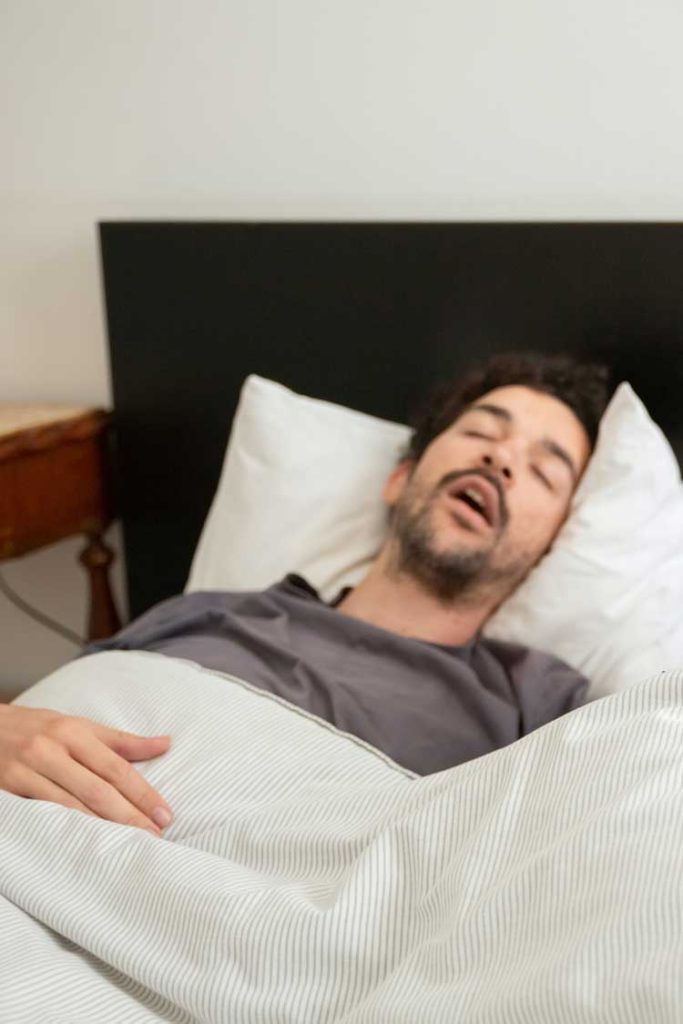Sleep Apnea
Better breathing leads to better health and Stewart Family Dentistry is here help
SLEEP APNEA
Sleep Apnea – How Your Dentist Can Help
If you have sleep apnea, you may not even know it. Sleep apnea is a disorder in which breathing is briefly and repeatedly interrupted during sleep. The interruption of breathing can last from a few seconds to minutes and may occur 30 times or more an hour. According to the National Sleep Foundation, as many as 18 million Americans suffer from sleep apnea.

What is Sleep Apnea?
Sleep apnea is a serious sleep disorder that occurs when a person’s breathing is interrupted during sleep. People with sleep apnea often snore loudly and frequently. Did you know there are different types of sleep apnea? Yes, there are three types of sleep apnea: obstructive, central, and mixed. Obstructive sleep apnea, the most common type, occurs when the throat muscles relax and block the airway. Central sleep apnea occurs when the brain does not send proper signals to the muscles that control breathing. Mixed sleep apnea is a combination of both types.
Sleep apnea can cause a variety of health problems, including high blood pressure, heart disease, stroke, and diabetes. It can also lead to accidents and injuries due to drowsy driving. People with sleep apnea often have trouble staying asleep and may wake up feeling exhausted.
Your team at Stewart Family Dentistry can help diagnose and treat sleep apnea. If you have sleep apnea, we may recommend a mouthguard or splint to keep your airway open during sleep. In some cases, surgery may be necessary to treat sleep apnea.
If you think you may have sleep apnea, contact Stewart Family Dentistry about your symptoms and treatment options.
The Different Types of Sleep Apnea and Treatment
Treating the three different types of sleep apnea: obstructive, central, and mixed. Obstructive sleep apnea is the most common type and occurs when your airway is blocked while you sleep. Central sleep apnea is less common and happens when your brain doesn’t send signals to your muscles to breathe. Mixed sleep apnea is a combination of both obstructive and central sleep apnea.
Your Stewart Family Dentistry team can help diagnose sleep apnea and recommend treatment options. If you have obstructive sleep apnea, we may recommend a mouthguard or oral appliance to keep your airway open while you sleep. For central sleep apnea, our team may refer you to a sleep specialist for further evaluation and treatment.

Causes of Sleep Apnea
There are a variety of different factors that can contribute to sleep apnea. In some cases, it may be due to an underlying medical condition. For example, people with diabetes or heart disease are more likely to develop sleep apnea. Other potential causes include:
- Being overweight or obese
- Having large tonsils or a large tongue
- Blockages in the airway (such as from a deviated septum)
- Smoking
- Drinking alcohol
- Use of certain medications (such as sedatives)
If you think you may be at risk for sleep apnea, it’s important to talk to your Stewart Family Dentistry dentist. Where we will be able to help you determine if you need to be tested for sleep apnea and, if so, what treatment options are available.
Symptoms of Sleep Apnea
Sleep apnea is a serious medical condition that causes your breathing to stop while you sleep. It can lead to health problems, including high blood pressure, heart disease, and stroke. Stewart Family Dentistry can help you treat sleep apnea with a custom-made mouthpiece that fits over your teeth and keeps your airway open while you sleep. If you have sleep apnea, talk to us about whether a mouthpiece is right for you.


How Your Stewart Family Dentist Can Help
If you’re one of the many people who suffer from sleep apnea, you may not realize that your we can actually help you treat this condition. While sleep apnea is most often associated with snoring, it’s a serious condition that can lead to health problems like high blood pressure, heart disease, and stroke.
Your dental professional at Stewart Family Dentistry can play an important role in diagnosing and treating sleep apnea. In some cases, your dentist may be the first health care professional to suspect that you have sleep apnea because of the signs and symptoms that are present in your mouth. For example, if you have teeth that are worn down from grinding or clenching, this can be a sign of sleep apnea.
Once sleep apnea is diagnosed, our team can work with you to develop a treatment plan. In some cases, this may involve using a custom-made mouthpiece that helps keep your airway open while you sleep. In other cases, surgery may be needed to correct the problem.
If you think you may have sleep apnea, be sure to talk to us at Stewart Family Dentistry about it. They can help you get the treatment you need so you can get a good night’s sleep and improve your overall health.
Have Questions? Call us now!
Next steps
If you think you might have sleep apnea, we can help. At Stewart Family Dentistry we will be able to assess your risk factors and symptoms to determine if you need to be referred to a sleep specialist. In the meantime, there are some things you can do at home to help ease your symptoms, like losing weight and sleeping on your side. If you have any questions or concerns about sleep apnea, don’t hesitate to reach out to Stewart Family Dentistry for guidance.
